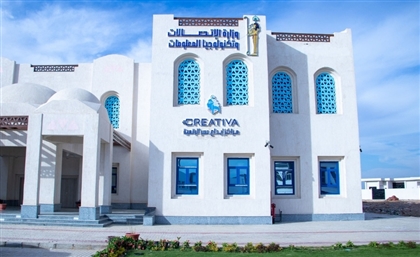Reshaping Egypt’s Workforce for the AI Era
We explore how Egypt can transform its labour market with AI and strategic education investments.

In a world that is rapidly shifting its classifications of what constitutes developed and developing nations, the implications of the immense disruptions of the COVID-19 pandemic on the global labour market are becoming more critical to examine in the wake of the world’s recovery. The pandemic highlighted the importance of countries having implemented effective frameworks and policies to rapidly adopt digital technologies that could facilitate the management of processes digitally and, crucially for workers during lockdowns, remotely. Massive advancements in digital transformation and Artificial Intelligence (AI) technology have been revolutionising the way global industries operate for decades, but the exponential rate of innovations in AI is directly contributing to changing the landscape of what is considered “desirable” labour.
Developments in generative AI, most notably OpenAI’s Large Language Model (LLM) ChatGPT, have already enabled companies and workers to begin to address the skills gap that developing economies are experiencing in strategic areas of investment. It improved productivity across traditional business functions and easing barriers to entry to more in-demand technical roles. Workers themselves are some of the first to recognize the opportunities provided by new digital working conditions, as supply continues growing to meet it. Increasing demands for skilled workers in fields like cybersecurity, cloud computing, data analytics and software development have already created new job opportunities for workers with even minor experience in coding and data management, if they are adaptable to continually developing the skills required by their industries.

Quality of education will be a determining factor in whether local job markets will be able to successfully meet employment demands for what are increasingly essential fields. In the case of Egypt, tech-based and tech-enabled businesses are constantly competing to recruit top talent in software development and investing in developing workers’ capabilities. However, relatively weak investments in the education sector overall are likely to create further shortages that will hinder the country’s labour demands if not rectified. Alternatively, successful case studies of effective fiscal spending on education to foster technological innovation are the UAE and Saudi Arabia.
Both countries started investing heavily in the future capabilities and tech-readiness of its workforce at the start of the 2000s, with the latter more than tripling its education budget allocation in the period between 2000 and 2013. In the UAE, education consistently accounted for a substantial portion of the state budget, with up to 20.5% allocated in some years during the 2010s. They prioritised making citizens competitive in international labour markets, investing in developing the capabilities of educators as well, recognizing that a well-educated workforce is crucial for innovative economic diversification and competitiveness in a modern globalised economy that is rapidly monetizing data. Private sector contributions to the UAE and Saudi Arabia’s ability to nurture their technology sectors have also been crucial, and part of both countries’ strategic direction to capitalise on advancements in technology to correct their economies’ high dependence on revenues from oil exports.

Growth implications are presenting themselves in the importance of structural reform for Egypt in particular. According to research conducted by PWC Middle East, Egypt is set to gain an estimated $42.7 Billion from AI adoption contributions to the economy by 2030. The Egyptian Ministry of Communication and Information Technology’s initiative, The Digital Egypt Strategy For Offshoring Industry 2022-2026, aims to capitalise on this potential growth by working to “triple export revenue from digitally-enabled offshoring services”, offering highly skilled technical workers in the fields of automation and software development.
This is in an effort to diversify economic activity and exports, create over 200 thousand new job opportunities, and increase the flow of much-needed foreign currency into the country. However, while upskilling has made it possible for some Egyptian workers to benefit from advancements and growing demand in tech, measurable benefits will still depend on the governments’ investments into making sure workers employed in sectors disrupted by advancement in generative AI, like manufacturing, industry, retail and health, are able and ready with the necessary skills to utilise the latest technologies to realise significant benefits in efficiency. It will also depend on facilitating a seamless evolution in labour market dynamics, as roles increasingly shift toward more sophisticated tasks, while generative AI automates routine and repetitive functions.

While all these necessary steps are crucial to prepare regional economies for AI adoption, mindfulness of the neo-colonial dynamics that govern modern global markets is also essential. Wealthier nations have been able to dominate AI and technological infrastructure, research, and patents, leaving developing nations reliant on foreign technology, in a perpetual cycle of playing catch up that is exploited by developed nations to increase their influence. Countries with advanced AI capabilities will be able to dominate in critical areas, further marginalising developing nations and perpetuating an asymmetrical influence on global policy. Issues of data sovereignty and privacy concerns are already reinforcing a digital divide. Exploitation of resources, such as labour and data extraction by global corporations needing to be addressed. Investing in homegrown talent, promoting local research initiatives, and developing strategic partnerships that emphasise knowledge transfer rather than simple technological adoption will be key in ensuring developing nations do not continue to be passive consumers of technology.

Ultimately, Egypt's projected growth hinges on more than just embracing advanced technologies - it requires a holistic approach to workforce development, economic diversification, and infrastructure improvements, otherwise, it risks falling behind its regional counterparts. Ensuring that AI adoption benefits a wide range of industries is key to achieving long-term sustainable economic growth.






















